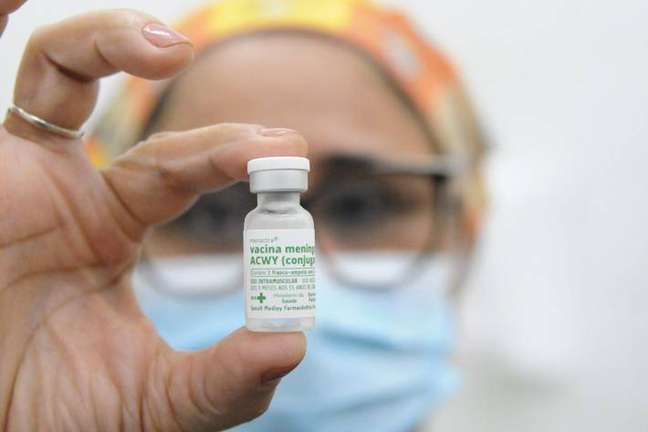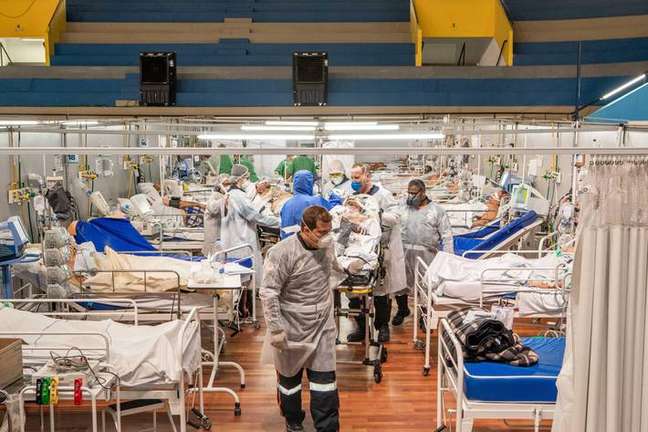The capital registered ten cases, despite the actions spread in two districts; The ministry stresses the importance of vaccination
The tenth death of meningitis confirmed Tuesday, in the capital, and the increase in cases in the cities of the interior of Sao Paulo has raised the alarm. Experts estimate that the decline in vaccination coverage during the covid-19 pandemic has left the state more vulnerable to transmission of the disease. They believe the scenario may worsen and recommend severity in blocking cases to avoid the risk of an epidemic.
Meningitis is inflammation of the meninges, the membranes that surround the brain and spinal cord. The disease, which can be caused by viruses and bacteria, is severe and has a respiratory transmission.

Common symptoms include headaches and neck pain, fever, vomiting, mental confusion, and skin blemishes. During the pandemic, preventive measures against Covid-19 caused cases to drop, but now, with more people moving, the disease is back.
In the capital, the death this week was a 22-year-old boy who lived in the north, according to the Municipal Department of Health (SMS). A 20-year-old girl from the south also fell ill: both cases were meningococcal. According to the file, only after the outcome of the laboratory analysis, which should be released within five days, will it be possible to know the type of bacterium and whether the two cases are of the same serogroup.
Also according to SMS, the cases are isolated and do not characterize new outbreaks, having no relationship with the outbreak located, at the moment, in the districts of Vila Formosa and Aricanduva, where five cases of type C meningococcus have been recorded, in the period of 16 months from July to September 15, with one death. The ministry considers an outbreak when three or more cases of the same type occur in a 90-day period in the same locality.
With the new cases, the capital has 58 confirmed cases of meningococcal meningitis since the beginning of this year. From January to September 2019, the period before the pandemic, there were 158 cases, which means there was a reduction of 68% in the general perimeter. The number of deaths is also lower, according to the ministry: there were 10 this year, compared to 28 between January and September 2019.
The secretariat provides for the vaccination of adults only in exceptional situations, such as the epidemic that occurs in the regions of Vila Formosa and Aricanduva. The exception is health care workers who can be vaccinated through a proof of employment in a health service in the city of São Paulo or a proof of profession, such as a certificate and diploma.
Other cities
Within São Paulo there are already dozens of cities with cases. In Marília, in the Midwest, there have been four deaths from the disease this year. The last death occurred in July.
This Thursday, 6, a child was admitted to the Unimed hospital, in Sorocaba, with a diagnosis of bacterial meningitis. The family used social media to ask for prayers. According to the prefecture, the city has already had 39 cases and 5 deaths this year. There were three isolated contact blocking actions.
In Jundiaí, visits to prisoners in Pavilion VII of the Provisional Detention Center (CDP) are suspended next weekend due to a case of bacterial meningitis affecting one inmate. According to the Department of Prison Administration (SAP), the patient is undergoing medical treatment and all monitoring and disinfection measures have been taken.
In the northern region, at least six cities have already registered cases of meningitis this year. Araraquara (6 cases), Leme (6), Pirassununga (5), Porto Ferreira (3) and Nova Europa (1) had bacterial cases. In Araras, the six confirmed cases are viral.
Other states
Other states are also seeing an increase in meningitis cases. In Bahia, 105 cases and 43 deaths from illness have already been recorded. The number of deaths is 50% higher than last year’s 21 deaths.
In Espírito Santo, 158 cases and 41 deaths from meningitis of various kinds have been confirmed. Last year there were only 83 cases and 19 deaths. The state Ministry of Health attributes the growth to the drop in the vaccination rate.
In Rio de Janeiro, 28 cases had been recorded by the end of August and seven people had died from meningococcal meningitis. There is a risk of making the scenario worse, as only 60% of children are vaccinated.
In Minas Gerais, the number of cases and deaths this year already exceeds that of the whole of last year. In 2021 there were 459 cases and 51 deaths in the whole year, while this year, from January to September, there are 468 cases and 71 deaths.
There are already eight confirmed cases of meningococcal disease in Pernambuco this year, but no deaths. So far, only 52% of children up to 1 year have been vaccinated.
The Ministry of Health reported that, in 2022, up to 30 September, 5,821 cases and 702 deaths from meningitis of various etiology were recorded. “Vaccination is considered the most effective way to prevent bacterial meningitis and vaccines are specific for certain etiological agents,” he said. According to the file, the vaccination of priority groups is maintained, according to the National Immunization Program (PNI).
In São Paulo, for example, the routine immunization program remains in place in the capital and in the interior of São Paulo, with the application of the immunizing agent against meningococcal meningitis C in children of 3, 5 and 12 months. The ACWY meningitis test applies in the 11 to 14 age group, exceptionally, until June 2023, as defined by the PNI.
Experts speak of risk scenario and suggest blocking actions

The situation is risky, according to infectious disease specialist Rosana Ritchmann, a reference in infectious diseases. “It is a disease caused by a bacterium transmitted by respiratory droplets, which reaches an unvaccinated and indirectly unprotected population, because if, in fact, we had vaccinated children and adolescents, as required by the National Immunization Program, the circulation of the bacteria would be much smaller and even unvaccinated people would be better protected. “
For her, the cases that are emerging in Sao Paulo are still an indirect and belated reflection of covid-19. “The pandemic has made the population hesitant to get vaccinated and, when you return to normal activities, without the use of a mask, unfortunately there is a risk of greater circulation of bacteria due to the lack of vaccination of the target population of the campaign. become more severe and we must block all reported cases, which is contact chemoprophylaxis and block vaccination, regardless of age. “
Infectious disease specialist Carlos Magno Fortaleza, a professor at the Unesp Faculty of Medicine in Botucatu, on the other hand, does not see the risk of a serious meningitis epidemic, along the lines of what happened in the 1970s. to do is step up vaccination in these groups participating in the national campaign, including HIV carriers and immunocompromised people, and block cases well. Any death averted is a victory, “he said.
“That group that was immunized when the vaccine was introduced into the children’s calendar is growing protected, but we have older groups that have never had the vaccine.” He thinks that, while that may not be the only reason, low coverage could contribute to greater transmission.
Both he and Rosana Rithcmann agree that it is not yet necessary to extend the vaccination to other groups. “There is no contraindication for us to vaccinate the general population, but the rational measure in terms of using our resources is the blocking of vaccination and the use of chemoprophylaxis for contacts.”
Marco Aurélio Safadi, of the Brazilian Society of Pediatrics (SBP) believes it is important to increase the vaccination coverage of adolescents. “They are the main vectors of transmission in the community. If we can vaccinate at least 80%, we also protect adults,” he said. “It is important to be aware of outbreaks, apply antibiotics to people in contact and stop vaccination for affected age groups.”
+The best content in your email for free. Choose your favorite Earth Newsletter. Click here!
Source: Terra
Benjamin Smith is a fashion journalist and author at Gossipify, known for his coverage of the latest fashion trends and industry insights. He writes about clothing, shoes, accessories, and runway shows, providing in-depth analysis and unique perspectives. He’s respected for his ability to spot emerging designers and trends, and for providing practical fashion advice to readers.







